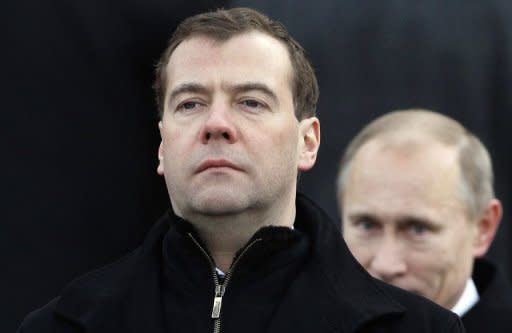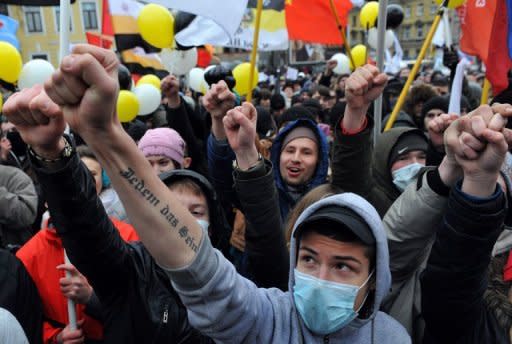Medvedev quits Kremlin with a whimper
When the Kremlin door slams shut on Dmitry Medvedev after Vladimir Putin returns to the presidency on May 7, the sound reverberating off the ancient red-brick walls may be one of bitter failure. Post-Soviet Russia is set to remember its only one-term president as a man whose biggest achievement was keeping the Kremlin seat warm for Putin when he was barred by the constitution from running for a third consecutive term. Youthful, interested in technology and apparently open to the West, Medvedev's promises to make Russia a freer, more democratic country created unprecedented hopes when he took office in 2008. But his agreement at a congress of the ruling United Russia party last September to willingly renounce his claim to a second term and swap jobs with 59-year-old premier Putin earned him mockery not just from the opposition but also from many of his former supporters. Incensed by the announcement and subsequent fraud-tainted parliamentary elections in December, tens of thousands of Russians took to the streets in protests on a scale unprecedented since the turbulent days of the early 1990s. "Dmitry Anatoliyevich, we feel sorry for you," prominent liberal television journalist Leonid Parfyonov, activist Ksenia Sobchak and singer Vasya Oblomov rapped in a song that went viral on the Internet. "Someday they will write: 'He was a good guy!'/ Russia's president with a human face.'" "Sat for four years, did not make any decisions,/ Vacated the seat, taught at Skolkovo," said the song referring to the innovation centre outside Moscow, Medvedev's brainchild. The cherubic-faced Kremlin chief, 46, repeatedly tried to break out of his mentor's shadow and demonstrate that he was his own man. But most of those attempts were indecisive and even half-hearted. He ordered Putin's government allies to stand down from the boards of state-run companies, publicly sparred with Putin on matters of foreign policy and even solemnly declared in April 2011 that he would soon announce whether he would run for a second term. Days later, the Russian president spent several hours with a tightly controlled pool of Kremlin reporters in the Chinese resort of Sanya seeking to explain himself as he sucked a tropical cocktail out of a coconut shell. Not a single word from the closed-door briefing was allowed to be released to the public. In a war of wills with his senior partner, Medvedev had apparently lost, and his promised announcement about his future plans never materialised. "Of course, if you are a visionary and ready to fight for your ideas, you achieve more," Igor Yurgens, a Medvedev adviser who repeatedly urged the Kremlin chief to run for a second term, told opposition newspaper Novaya Gazeta. "But if you are a moderate liberal with an eye on your comrades, with a sense of gratitude towards the one who elevated you to such heights, everything comes out half-baked," he said. The Internet-savvy, i-Pad-wielding Medvedev insists the country had become a freer nation during his four-year term, citing the recent mass protests as proof of irreversible change. "I believe that we've truly come far when it comes to civil liberties," he said in his last televised interview to liberal-leaning reporters late last month. "Freedom is a sense of self. And in this respect we've done a lot." Human rights activists scoff at the idea. They point to the prison death of 37-year-old lawyer Sergei Magnitsky from untreated medical conditions in 2009; and the second trial of former tycoon Mikhail Khodorkovsky resulting in a sentence that is set to keep him behind bars until 2016. Critics add that Medvedev's much-touted "reset" with the United States was heavy on symbolism but light on substance. An obscure Kremlin official in 2008, Medvedev won the elections on the back of Putin's support and owes his entire political career to the former KGB agent. A lawyer by training, Medvedev met Putin in the early 1990s when they were both working in the mayor's office of their native Saint Petersburg. Putin took his protege to Moscow after being appointed prime minister in 1999 and Medvedev rapidly rose to be chairman of gas giant Gazprom and also chief of staff at the Kremlin and then first deputy prime minister. Medvedev is expected to take Putin's current job of prime minister in the new government, but many say he may not last long. "It is obvious that in the post of prime minister he cannot be more efficient than he was at the post of president," said Lilia Shevtsova, an analyst at the Carnegie Moscow Centre. She described Medvedev as "political botox" whose aim was to make Putin's Russia slightly more palatable to the West. "Russia is stagnating. A social and economic crisis cannot be ruled out. Putin may have to make Medvedev a scapegoat," Shevtsova told AFP.




